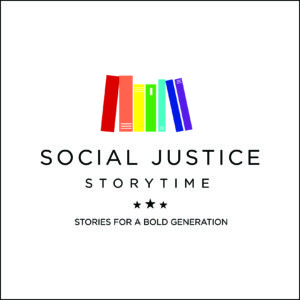 By Jessica Hulick, Social Justice Storytime, Executive Director
By Jessica Hulick, Social Justice Storytime, Executive Director
For all of my adult life, I have been a volunteer and community organizer, focusing on LGBTQAI equality, anti-racism work, gun violence prevention, reproductive rights, and advocating for differently-abled people. But when my first child was born, all of my previous organizing and campaign experience took on new dimensions. I found myself planning events that I could no longer take part in. How would my breastfed, bottle-hating daughter stay fed, if I was arrested in protest or wanted to attend a conference? How does one quietly entertain a squirmy toddler, while sitting at the Legislature? Canvassing is only interesting to a toddler for about three houses! Before children, I could make a phone call any time. Now? If I start talking on the phone, my children will be in sudden and desperate need of a peanut butter and jelly sandwich! Every time.
My new identity as a mother was all consuming, as every mother knows. But my identity as an activist did not diminish. In fact, looking at my brand new humans made my drive to change the world even stronger. My research as a new mom led me to buy every “progressive” children’s book that I could find. I wanted my kids to be surrounded with books with two mommies, two daddies, working class folks, representation of our transgender and non-binary friends and our black and brown friends. And as a feminist, I had to figure out how to raise a male-identified child. I want him to feel safe to express his emotions and not allow toxic masculinity to guide him. I want him to treat women as his equal and reject violence as part of being a man. And I want him to always feel free to paint his toe nails.
Thankfully, I was able to connect with other mothers in activism, through Moms Demand Action for Gun Sense and MomsRising. These organizations introduced me to incredible communities. Then, in 2016, Standing Up for Racial Justice suggested “racial justice story time” to its membership to promote children’s books with people of color at the center. As an activist and a mother, I loved this idea and I wanted to expand it to so many important topics. I gathered the books from around our house and I contacted organizations that dealt directly with various issues, and got their book recommendations. I talked to members of different communities and really listened to their perspectives, lived experiences, and recruited them to help! And with the help of many amazing community members, Social Justice Storytime was born.
Our mission is to promote an inclusive community by creating a nurturing space for children and families to learn and discuss contemporary issues through children’s literature. Currently, we hold several community events each month and we are in four after school programs, always looking to expand. Some of our topics include differently-abled people, immigration and refugees, LGBTQIA people, racial equity, and many others. Our primary goal is to educate ourselves and our children in order to build stronger and safer communities. Recent research suggests prejudices may form at a much earlier age than previously thought, sometimes as early as three years of age. We work to combat that reality and help our children to grow as open-minded, accepting individuals. We know that the stories we hear in childhood have the power to revolutionize our lives.
We are developing a curriculum of carefully chosen books, activities, and crafts for young children. As I am not a licensed educator, my initial development of curriculum for Social Justice Storytime was organic. I started with my closest source: my own children. I wrote down the questions and comments that they asked. I took note of the parts that were emotional for them or confused them. I researched my answers, sometimes telling the children that I needed to think about it. From this family exploration, I found that neutral, honest answers to the aspects of life and justice that we questioned are difficult but absolutely necessary. In talking with other parents, I found that they are looking to have these conversations but they are often afraid of “doing it wrong.” Our curriculum includes an extensive book list and discussion questions for each, as well as links to additional resources.
Social Justice Storytime feels like the perfect combination of everything in my life, to this point. It is parenting, activism, children, and stories. Not to mention that Master’s Degree in Applied Sociology that I haven’t ever really used! All of my passions are in one project and I am finally, at age 40, putting it all together. Changing the world is a long, difficult process but focusing on our children is tangible and meaningful. The children are incredibly receptive, excited to participate and tackle big issues. I have learned so much from these children. They are honest, curious, and loving. And our collective parenting is the activism that can make all the difference.

There are no comments
Add yours